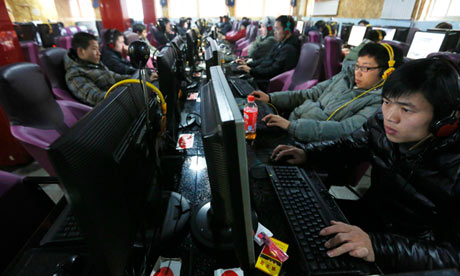China shrugs off accusations of jamming BBC broadcasts
Officials dismiss corporation's statement condemning blocking of its English-language World Service radio broadcasts

Internet cafe in
Beijing: the BBC’s Chinese-language website is often blocked, as were
Bloomberg and New York Times last year. Photograph: How Hwee Young/EPA
China has brushed off accusations of jamming the BBC's English-language World Service radio broadcasts a day after the broadcaster announced the interference.
"I don't understand this situation," foreign ministry spokesperson Hua Chunying said at a daily press briefing on Tuesday, when asked to comment on the allegations. She said reporters should contact "relevant departments" for further information, but did not specify which departments or how to contact them.
The BBC said on Monday its shortwave radio broadcasts have been jammed in China because of "extensive and co-ordinated efforts" that "are indicative of a well-resourced country such as China".
"The BBC strongly condemns this action which is designed to disrupt audiences' free access to news and information," the corporation said in a statement.
This is not the first time the BBC has encountered some form of interference in China. Its television broadcasts frequently go blank in the middle of sensitive reports. The broadcaster's Chinese-language website is often blocked, and its Chinese-language radio broadcasts have been intermittently jammed for years.
Other international broadcasters such as Voice of America and Radio Free Asia are also jammed in China. Websites of the New York Times and Bloomberg were blocked last year after they published exposés on the wealth accumulated by families of the country's leading politicians.
Some analysts were confused by the timing of the BBC's announcement. "This for me is very weird – it's almost like 1990s," said Michael Anti, a prominent media commentator in Beijing.
He said that in China people associate the BBC with its television dramas and Chinese-language news website, which is blocked but can be accessed using software to bypass internet censors.
"I doubt there is anyone listening to the BBC English radio in China," he added.
BBC journalists were briefly detained last week by Chinese military personnel while filming a nondescript 12-story building in Shanghai that American cyber-security experts have pinpointed as ground zero for a slew of hacking attacks against foreign organisations. The journalists were released after they agreed to surrender their footage.
"I don't understand this situation," foreign ministry spokesperson Hua Chunying said at a daily press briefing on Tuesday, when asked to comment on the allegations. She said reporters should contact "relevant departments" for further information, but did not specify which departments or how to contact them.
The BBC said on Monday its shortwave radio broadcasts have been jammed in China because of "extensive and co-ordinated efforts" that "are indicative of a well-resourced country such as China".
"The BBC strongly condemns this action which is designed to disrupt audiences' free access to news and information," the corporation said in a statement.
This is not the first time the BBC has encountered some form of interference in China. Its television broadcasts frequently go blank in the middle of sensitive reports. The broadcaster's Chinese-language website is often blocked, and its Chinese-language radio broadcasts have been intermittently jammed for years.
Other international broadcasters such as Voice of America and Radio Free Asia are also jammed in China. Websites of the New York Times and Bloomberg were blocked last year after they published exposés on the wealth accumulated by families of the country's leading politicians.
Some analysts were confused by the timing of the BBC's announcement. "This for me is very weird – it's almost like 1990s," said Michael Anti, a prominent media commentator in Beijing.
He said that in China people associate the BBC with its television dramas and Chinese-language news website, which is blocked but can be accessed using software to bypass internet censors.
"I doubt there is anyone listening to the BBC English radio in China," he added.
BBC journalists were briefly detained last week by Chinese military personnel while filming a nondescript 12-story building in Shanghai that American cyber-security experts have pinpointed as ground zero for a slew of hacking attacks against foreign organisations. The journalists were released after they agreed to surrender their footage.


